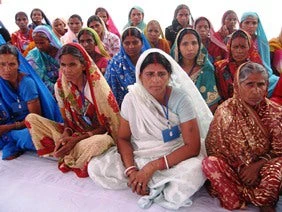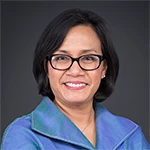
Photo: Nandita Roy / World Bank
I was sitting on the floor, across from Devi, a mother of eight, who belonged to one of the most vulnerable and socially excluded castes in India. She recalled how when her husband got injured and lost his job a few years ago, the family was pushed over the brink — from subsistence to hunger and poverty. At the time, Devi took a bold step for a poor woman used to living in the shadows of society. She joined a women's self-help group in her village and took a small loan to raise goats. With the income she generated, she repaid her first loan and took another one — this time to lease land to produce grain. She borrowed again when her family faced a health crisis. Today, Devi has several sources of income. She is also planning ahead. She wants to open a food outlet on a busy road. And now, with two of her sons married, she wants to find a larger living space for her growing family.
To be sure, Devi and the women in her self-help group still have a long way to go. Yet this is a remarkable story of empowerment through collective action. To me, the confidence these women had cultivated over time carries as much currency as their earnings. It inspired them to organize themselves and work hard toward building a better future. And this is precisely the objective of the World Bank-supported project in Bihar: to empower rural communities where the poverty rate stands at a staggering 55%. Since 2008, some 700,000 households have joined self-help groups under the program.
The story of Bihar itself is a remarkable one. With a population of 100 million people, Bihar is India's poorest state. Average income is $294 per year, less than all but two Sub-Saharan African countries. For many years, Bihar was known for poverty, corruption, and a society deeply divided by the caste system. Then in 2005, under the leadership of Chief Minister Nitish Kumar, the government launched an ambitious development program. It invested in roads, public health care, and school systems. It even gave bicycles to girls as a reward for staying in school, which resulted in a fall in dropout rates. And economic growth outpaced the national average, reaching 13%.
But despite these impressive achievements, Bihar continues to face daunting challenges. During my visit, Kumar, now in his second term, told me that more rural roads were needed to connect smaller communities to markets. He also wanted to invest in secondary education for girls. Maternal mortality rates remain stubbornly high, with far too many women dying during childbirth. And more than half of children under 3 suffer from malnutrition. Furthermore, the government’s capacity to implement the programs continues to be weak.
Despite the fact that India remains home to one-third of the world's poor, I believe that the country — and especially Bihar — is proof that development works. India’s story of economic growth and human development in recent years shows how millions can be lifted out of poverty. In April, World Bank Group President Jim Yong Kim put forward an ambitious goal to end extreme poverty — people living on $1.25 or less a day — by 2030. This will require enormous global efforts — not just in poor countries, but also in emerging economies where large numbers of the poor are concentrated. And it cannot be done without India.
That is why the World Bank will focus its efforts and resources on states like Bihar. Responding to the challenges Kumar described requires tailoring our approach to meet the specific needs of low-income states by developing innovative programs; deploying experienced staff in those states; and working closely with local institutions to help them deliver the services their citizens need.
India's success in lifting its people out of poverty matters to the rest of the world. Other developing countries can draw from its experience on what works and what doesn't in public policies, governance and accountability frameworks, and development practices. They can learn from the transformation of lives — like those of Kunti Devi and others in her self-help group. Only when we can help replicate their stories will we be able to see a world without extreme poverty — in our lifetime.


Join the Conversation